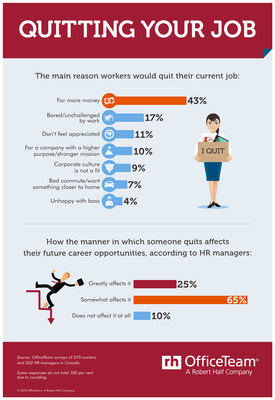Jillian Levick
Senior PR and Communications Manager
Robert Half Canada Inc.,
181 Bay Street, Suite 820,
Toronto, ON
M5J 2T3
www.roberthalf.ca
Press Releases
Read about our latest research, including results from our ongoing surveys of senior managers and workers, and company announcements.

90 per cent of HR managers said the way someone quits affects their future career opportunities
TORONTO, July 9, 2018 /CNW/ - Money really does talk, suggests new research from staffing firm OfficeTeam. More than two in five Canadian workers (43 per cent) said they'd leave their job for one with better pay. In terms of gender, 45 per cent of men would resign if offered more money elsewhere, compared to 39 per cent of women.

Whatever the reason for leaving, employees should have a good exit plan when parting ways with a company. In a separate survey of Canadian HR managers, 90 per cent said the way someone quits affects their future career opportunities.
Workers were asked, "Thinking of your current job, what is the most likely reason you would quit?" Their responses:
|
For more money |
43% |
|
Bored/unchallenged by work |
17% |
|
Don't feel appreciated |
11% |
|
For a company with a higher purpose/stronger mission |
10% |
|
Corporate culture is not a fit |
9% |
|
Bad commute/want something closer to home |
7% |
|
Unhappy with boss |
4% |
|
101%* |
|
*Responses do not total 100 per cent due to rounding. | ||
HR managers were asked, "How does the manner in which someone quits a job affect that person's future career opportunities?" Their responses:
|
Greatly affects it |
25% |
|
Somewhat affects it |
65% |
|
Does not affect it at all |
10% |
|
100% |
"Professionals want to be rewarded and recognized for their efforts at work, and will move to find an employer who provides that satisfaction," said Koula Vasilopoulos, a district president for OfficeTeam. "When considering a job change, workers should first discuss any issues with their current manager, who may be able to offer things like additional incentives or development opportunities to help keep talented employees engaged and committed."
For those deciding to leave, Vasilopoulos stressed the importance of doing so on good terms. "Departing on a high note helps maintain a positive professional reputation that will follow you as you progress in your career."
OfficeTeam offers workers the following don'ts when quitting a job, along with advice for what to do instead:
|
Don't |
Do This Instead |
|
Make a rash decision |
Think carefully through the pros and cons of |
|
Tell your boss last |
Schedule a meeting with your manager to |
|
Leave others in the lurch |
Tie up loose ends on projects. Offer to help |
|
Burn bridges |
Thank colleagues and exchange contact |
|
Walk before you talk |
If an exit interview is offered, provide |
About the Research
The surveys were developed by OfficeTeam and conducted by independent research firms. They include responses from more than 500 workers 18 years of age and older and employed in office environments in Canada and more than 300 HR managers at Canadian companies with 20 or more employees.
About OfficeTeam
OfficeTeam, a Robert Half company, is the nation's leading staffing service specializing in the temporary placement of highly skilled office and administrative support professionals. The company has more than 300 locations worldwide. For additional information, visit roberthalf.ca/officeteam. Follow roberthalf.ca/blog for career and management advice.
SOURCE OfficeTeam
